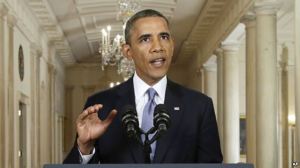The speech that President Obama just gave on Syria was a depressing example of the empty rhetoric and hypocritical moral posturing that make up the political discourse in this country. He begins by saying:
- Over the past two years, what began as a series of peaceful protests against the repressive regime of Bashar al-Assad has turned into a brutal civil war. Over 100,000 people have been killed. Millions have fled the country. In that time, America has worked with allies to provide humanitarian support, to help the moderate opposition, and to shape a political settlement. But I have resisted calls for military action, because we cannot resolve someone else’s civil war through force, particularly after a decade of war in Iraq and Afghanistan.
The situation profoundly changed, though, on August 21st, when Assad’s government gassed to death over a thousand people, including hundreds of children. The images from this massacre are sickening: Men, women, children lying in rows, killed by poison gas. Others foaming at the mouth, gasping for breath. A father clutching his dead children, imploring them to get up and walk. On that terrible night, the world saw in gruesome detail the terrible nature of chemical weapons, and why the overwhelming majority of humanity has declared them off-limits — a crime against humanity, and a violation of the laws of war.
Images of people killed by conventional bombs are every bit as sickening as the images described here. So what is it that makes chemical warfare a “crime against humanity”? It’s not until the middle of the next paragraph that Obama tries to give an answer to that question:
- Because these weapons can kill on a mass scale, with no distinction between soldier and infant…
Conventional weapons can also kill on a mass scale, and they also do not distinguish between soldier and infant. The idea that chemical weapons are more inhumane than other weapons has no basis in fact. If there is anything peculiarly destructive about chemical weapons, it is the fact that some chemicals, such as Agent Orange, can linger in the environment and do long-term damage. (Although I’m guessing that Obama doesn’t consider Agent Orange to be a chemical weapon.)
Obama cites two examples from history of the use of chemical weapons:
- In World War I, American GIs were among the many thousands killed by deadly gas in the trenches of Europe. In World War II, the Nazis used gas to inflict the horror of the Holocaust.
Obama conveniently neglects to mention that Saddam Hussein used poison gas against the Kurds and Iranians, back when he was still a U.S. ally. The president at that time was Ronald Reagan, a man for whom Obama has expressed great admiration. (I think it worth noting here that during World War I, more people were killed by artillery and machine guns than by deadly gas.)
The President goes on to say:
- When dictators commit atrocities, they depend upon the world to look the other way until those horrifying pictures fade from memory. [Uh, you mean like Saddam Hussein?] But these things happened. The facts cannot be denied. The question now is what the United States of America, and the international community, is prepared to do about it. Because what happened to those people — to those children — is not only a violation of international law, it’s also a danger to our security.
Let me explain why. If we fail to act, the Assad regime will see no reason to stop using chemical weapons. As the ban against these weapons erodes, other tyrants will have no reason to think twice about acquiring poison gas, and using them. Over time, our troops would again face the prospect of chemical warfare on the battlefield. And it could be easier for terrorist organizations to obtain these weapons, and to use them to attack civilians.
This is a sophisticated reformulation of the “if we don’t fight them over there, we’ll have to fight them over here” argument that was wildly popular back when G.W. Bush was in the White House. First of all, our troops already face the prospect of chemical warfare, which is why they are trained in the use of gas masks. I think it a fair guess that many governments – dictatorships or otherwise – possess chemical weapons of one kind or another, regardless of any treaties. As for terrorists getting a hold of chemical weapons, that is a real possibility, I’m afraid, but it would be naïve to think that bombing Syria is going to prevent any possibility of that happening.
- If fighting spills beyond Syria’s borders, these weapons could threaten allies like Turkey, Jordan, and Israel. And a failure to stand against the use of chemical weapons would weaken prohibitions against other weapons of mass destruction, and embolden Assad’s ally, Iran — which must decide whether to ignore international law by building a nuclear weapon [which is not against international law], or to take a more peaceful path.
So, this is really about Iran? Obama thinks that if he kills a bunch of Syrians, this will convince the Iranians that they shouldn’t build any nuclear weapons? Might not the Iranians draw the exact opposite conclusion? They might decide they need nuclear weapons so the U.S. won’t attack them the way it did Syria.
The President’s speech ends on an optimistic note. He tells us he has decided to postpone asking Congress to authorize the use of force, so he can pursue a proposal by Russia to have Syria turn over its chemical weapons so they can be destroyed. It appears that Putin has saved Obama from the humiliation of Congress voting down the authorization. Bullshit can only get you so far in this world. Obama has once again benefited from dumb luck.

Leave a comment